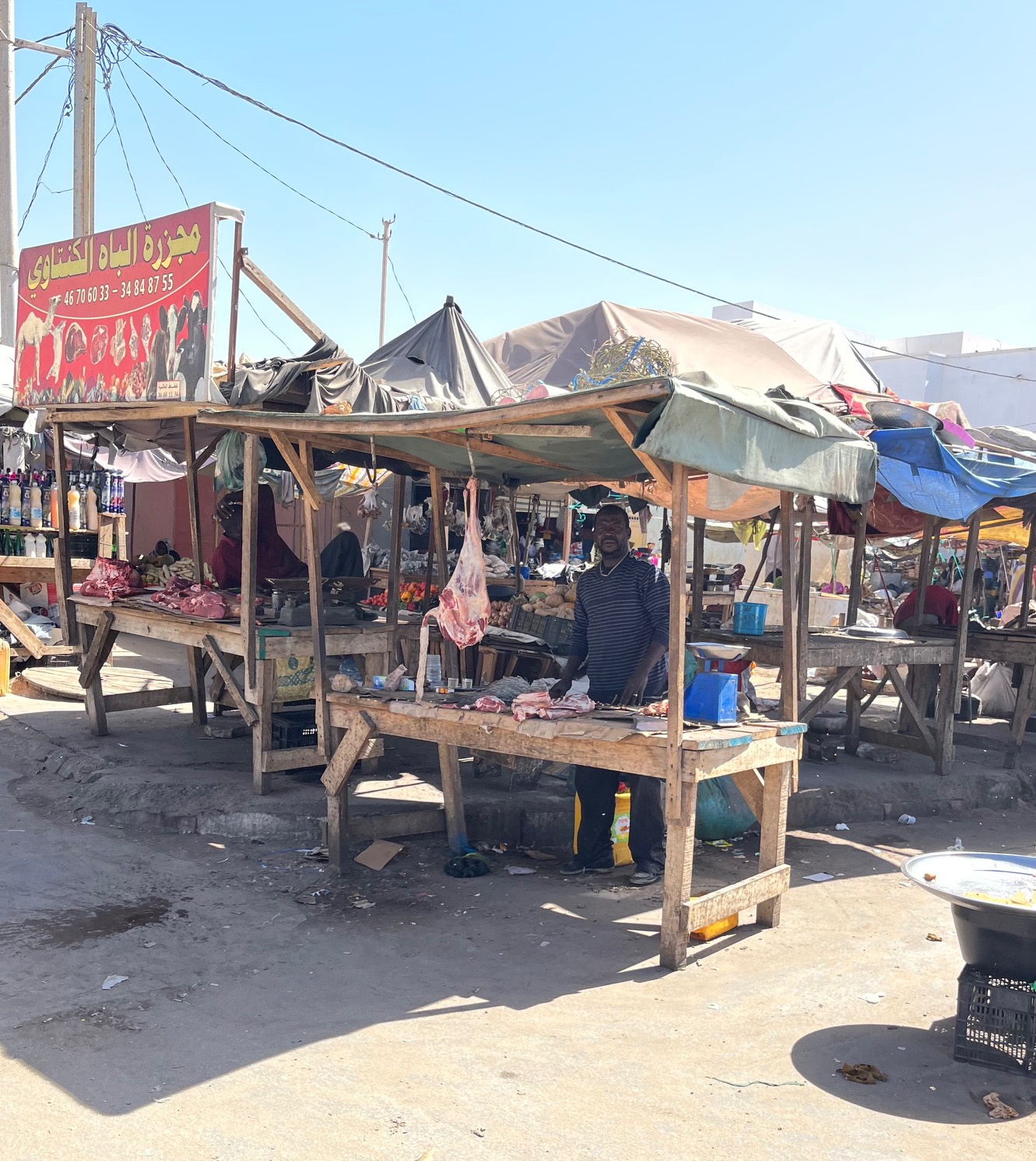In Mauritania, the food and drink culture is deeply influenced by the country’s desert environment, nomadic heritage, and Islamic traditions. Here’s what you can generally expect in terms of food and drink:
Typical Dishes in Mauritania
Mechoui
A traditional dish of slow-roasted whole lamb, often served at special occasions like weddings and celebrations. The lamb is seasoned with a variety of spices and cooked until tender, typically served with flatbread or rice.
Couscous
A common dish made of steamed semolina, often served with a rich stew of meat (such as lamb or chicken) and vegetables. It is a staple meal across Mauritania, especially for large family gatherings.
Thieboudienne
This is a Mauritanian variation of a classic West African dish. It consists of rice cooked with fish, vegetables (like carrots and tomatoes), and a flavourful tomato sauce. It’s often considered the national dish and is a must-try for visitors.
Shawarma
A staple across the Middle East and North Africa, the shawarma is a sandwich or wrap filled with grilled or roasted meat, typically lamb, beef, or chicken. It’s served with fresh vegetables like tomatoes, onions, and sometimes pickles, all wrapped in deliciousness.
Tagine
A slow-cooked stew typically made with meat, such as lamb or chicken, and vegetables. It’s flavoured with spices, and often dried fruits like apricots or prunes are added, giving it a sweet-savory taste. It’s named after the clay pot in which it’s traditionally cooked.
Lablabi
A hearty chickpea soup made with spices, often served with pieces of bread, a hard-boiled egg, and sometimes tuna or olives. This dish is very popular during colder weather or as a filling breakfast.
Mburu
A rich and flavourful Mauritanian soup made from beef or goat meat, combined with a variety of vegetables and spices. It’s often eaten with rice or bread.
Boulfaf
Boulfaf is a Mauritanian delicacy, especially prepared during the feast of Eid al-Adha, known locally as Tabaski. It consists of grilled liver wrapped in caul fat (the membrane that surrounds the internal organs of some animals) and seasoned with a cultivated blend of spices. It’s then placed on skewers and grilled over an open flame. The result is a rich and intensely flavourful dish that’s enjoyed by locals and adventurous foodies alike.
Desserts
Pudim D’avocat
Pudim d'Avocat is a Mauritanian dessert made from ripe avocados blended with sweetened condensed milk, eggs, and vanilla. The mixture is baked into a smooth, creamy custard. Often chilled, it has a rich, velvety texture and a refreshing flavour, balancing sweetness with the natural creaminess of avocado.
Makroudh
Makroudh is a traditional North African pastry, commonly enjoyed in Mauritania. Made from semolina dough, it is filled with a sweet date paste, shaped into diamond or square pieces, and fried until golden. The pastries are then soaked in honey, giving them a crisp texture with a sweet, syrupy finish.
Drinks
Mint Tea
Mauritania’s most iconic drink, which is traditionally prepared with green tea, sugar, and fresh mint leaves. Tea is an important part of social life and is served during gatherings, often in three rounds, each with a different flavour intensity.
Juices
Fresh fruit juices (such as orange, mango, and papaya) are also popular, especially in urban areas.
Coffee
Coffee is often consumed in Mauritania, but it is typically strong and unfiltered, sometimes mixed with spices like cardamom.
Alcohol
Alcohol is generally not consumed in Mauritania due to the country’s Islamic laws, which prohibit its consumption. However, some international hotels or certain expatriate communities may serve alcohol in private settings.
Eating Etiquette
Hands
It’s common to eat with the right hand, particularly when eating communal dishes.
Sharing
Meals are often shared with family or guests, and it’s customary to eat from a common dish in social settings.
Hospitality
Mauritanians are known for their hospitality, and visitors are often invited to join in meals.
Mauritanian cuisine is rich and diverse, with a focus on hearty, flavourful meals. Expect plenty of rice, meat, couscous, and fish, with a heavy use of spices. Drinks, especially mint tea, play an important role in social interaction.


